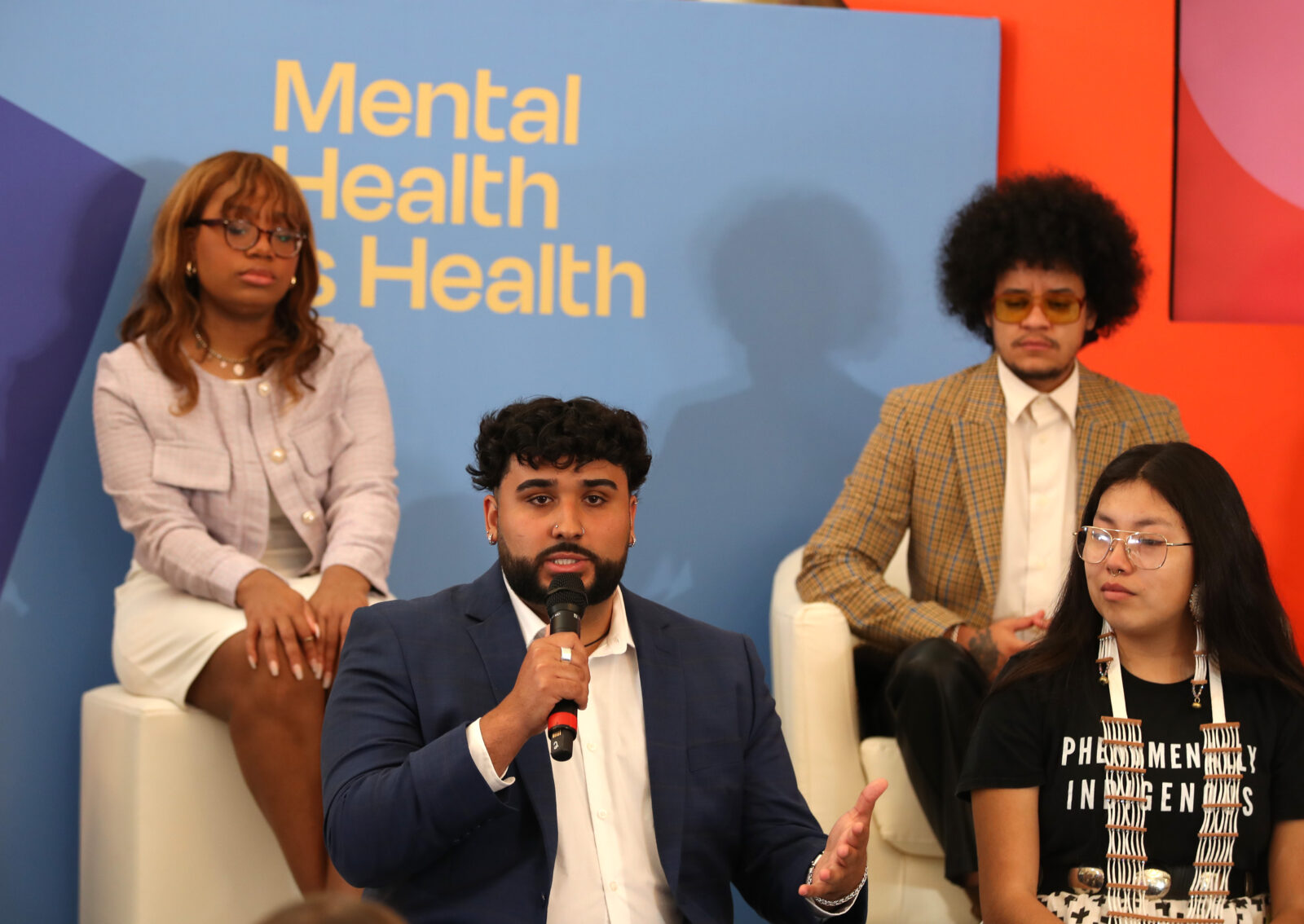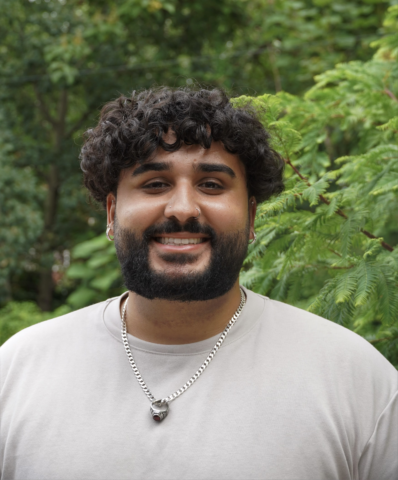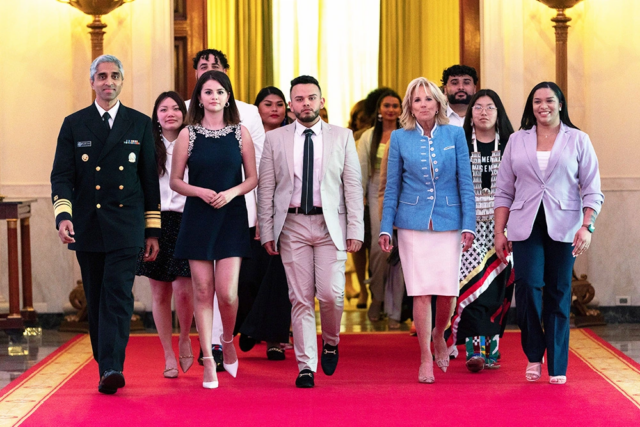ACE Interview: Jorge Alvarez on Mental Health Activism and Climate Change
Victoria Whalen, ACE Fellow
|June 24, 2022

Jorge Alvarez is a 23-year-old recent first-generation college graduate, mental health advocate, digital strategist, and content creator who combines his appreciation for creative storytelling and video to inspire action, empower others, and build community. Through sharing his lived experiences and the lessons learned along the way, Jorge’s content not only destigmatizes mental health but cultivates space for collective reflection, unlearning limiting beliefs, and generational healing through breaking cycles. Jorge is expanding the definition of what it means to create authentically through embracing vulnerability and his identity as a Latino/a/x man. Today, Jorge has and continues to aspire to drive social impact and change through media and strategic partnerships which spotlight underrepresented communities. Some of Jorge’s previous clients include TikTok, Instagram, Unilever (Dove), BetterHelp, non-profits, and small businesses. Jorge has received recognition through a number of features including: Forbes, NBC, Cheddar News, Yahoo, Authority Magazine, andTikTok, where he was also featured on the discover page, Latinx/Hispanic Heritage Month mural in NYC, and was selected to participate in the inaugural Latinx Creatives Accelerator program.
Victoria Whalen (VW): When did you first learn about climate change and the climate crisis? How has it impacted your life?
Jorge Alvarez (JA): I first learned of climate change in elementary school. At the time, conversation around global warming and the ozone layer degradation had become mainstream—I’d hear about it everywhere from my TV at home to my classroom in school. I specifically remember seeing Disney segments before some of my favorite shows about ways I could be more eco-conscious by conserving energy or being mindful of my water use when brushing my teeth. At school, my science teachers would show us educational videos like Tim and Moby about global warming and why it was an important issue that we should care about. Looking back, it’s interesting because although I did not fully grasp the urgency of the issue, I felt compelled to participate and practiced many of the suggestions I learned about.
I recall a distinct shift in the conversation around climate change when I began high school in 2014. The biggest difference from the conversation that had begun in elementary school was who is to blame for the rapid downhill progress of climate change. Responsibility no longer fell solely on everyday people. Instead of encouraging people to “step up” by using less water when they brush their teeth, fingers were being pointed at corporations who were not only responsible for most of the harm committed to the environment but also had the money to make a significant difference. Learning about climate change from an early point in my childhood definitely shaped the moral responsibility I feel when it comes to the issue. I was more conscious of my actions and how they contributed to climate change. I also felt called to participate in the movement.
In more recent years, learning about the severity of climate change has made me a bit more worrisome and anxious at times. When I struggled with my mental health, it felt like yet another issue that was out of my control and as though “doomsday” was inevitable. Thankfully, finding communities, people, and resources to turn to in these moments have continued to make me feel empowered in my ability to have an impact.
VW: How would you define mental health activism?
JA: I would describe mental health activism as a human-first and community driven movement that impacts all people. Mental health activism is all about embracing vulnerability, learning and unlearning, and striving to be the best and most content version of yourself—all while encouraging others around you to do the same. Everyone, regardless of how you identify, has mental health which is what makes the movement so beautifully interconnected from nation to nation.
VW: Was there a defining moment in your life that made you take your mental health seriously? How did that translate to becoming a mental health advocate?
JA: Of course! From experience meeting different people in the space or in my day-to-day, it seems like everyone has had that one *defining* moment which led to them taking their mental health seriously. On one hand, I’m grateful that I’ve met so many people who’ve had similar experiences, but on another, it’s frustrating how most of us need to reach a breaking point before we then prioritize our mental health, which is yet another reminder as to the importance of mental health advocacy and activism.
Buuut back to the question. The defining time of my life that made me take my mental health seriously was my first year of college. As a first-generation college student, I lacked guidance and support. I struggled to find community and feel belonging. I felt alone, lost, unwanted. All this, in addition to having just escaped a very emotionally abusive relationship at the time, led to me spiraling into depression. Days felt long and short all at the same time. I lost myself, but at one point, a switch went off in my head and I realized what I was feeling was not okay and that I needed help. It was then that I reached out to my campus counseling center and began my healing journey.
After only a couple of months in therapy, I was amazed with how transformative the experience was but I also began to question how I wound up at such a low point. Through reflection and a really good therapist, of course, I began to understand the reasons why I felt how I felt and waited so long. For one, NO ONE was talking about it! It was like mental health just didn’t exist. Second, there was NO ONE WHO LOOKED LIKE ME speaking about or encouraging me to get the help that I needed. Third, cultural stigma and boundaries were super prevalent and still are. When I conceptualized all of this I remember telling myself, “Wow, me getting to this point could have been avoided if people, especially other Latinos, spoke more about mental health and how real it is.” From this moment on, I decided to use my voice to serve as the representation and create the spaces that I was lacking and still do.

VW: Climate trauma is being talked about more as we dive deeper into the climate crisis. Have you experienced any climate trauma? How did you overcome it?
JA: Although I have a lot of friends who experience climate trauma, I personally have not. However, in recent months I’ve been experiencing anxiety at the thought of our current climate crisis alone. As a recent college graduate, I already have a lot of important life decisions to make. But add the fact that the planet may not be alive in another 50 years and all these decisions feel pointless. I get anxious at the thought of what the state of the world will be or even feel like 10 years from now.
Similar to what I mentioned earlier though, when I do feel this anxiety I lean on my friends and speak about these anxieties out loud. This really really does make a difference because 9 out of 10 times, the person listening has experienced similar feelings which makes me feel less alone and scared. A big part of my healing recently has been practicing what it means to be present. So when I get these thoughts, I remind myself that all that truly matters is this moment right now, before me. Quick shameless plug, if you haven’t already watched the movie Everything Everywhere All At Once, please do yourself a favor and do so ASAP. It’s one of my favorite movies!
VW: Youth around the world are taking climate change activism by storm. Do you have any advice on how to balance activism with self-care and mental health?
JA: All of us, somehow, are politically and socially involved and connected whether we see it or not. For a lot of the people at the front lines of movements, this is only further amplified. Most of us are personally engaged in activism during our free time, when we’re creative, and even in our 9 to 5s. Obviously, this can be and is a lot but because we care so much about the issue, we don’t immediately see anything wrong with this. Well, from personal experience with struggling with my own boundaries when it comes to my advocacy work, this can quickly lead to burnout. And trust me, I was burnt out myself. But what’s worked really well for me has been practicing setting and most importantly, respecting boundaries that I set for myself. I also set intentional time in my schedule to simply be and exist. Setting time or participating in activities that have nothing to do with my advocacy and activism has been key to sustaining my energy. We need to pour into our cups before anyone else’s!
A big part of my healing recently has been practicing what it means to be present.
VW: Why do you think advocating for positive mental health care amongst the younger generations is important?
JA: Today, young people are the most impacted by mental illness. In fact, the number two leading cause of death among young adults is suicide. Advocating for positive mental health care amongst the younger generations is critical in addressing the mental health crisis the United States and world is facing today because there is no reason for young people to feel alone. They and we need to know that it’s okay to not be okay. That vulnerability is not weakness but strength. That asking for help is one of the most amazing things you could ever do for yourself.
VW: As a content creator and digital storyteller, how do you think technology and social media affect mental health and activism?
JA: Technology and social media has a two fold effect when it comes to mental health. We cannot talk about the strengths of technology and social media without first acknowledging the negative impact that social media can have on young people. Research has proven, time and time again, that social media has a huge negative effect on young people’s mental health. This is why we need more representation and intention behind the scenes where apps, social platforms, and softwares are being developed. We need more accountability and responsible designers proactively thinking about potential harm… and we are.
More and more people are going into tech with the goal of creating tools that drive positive change and social impact. I have complete hope that the tech industry will continue to evolve and be shaped by young people with visions of creating responsibly. As a content creator and digital storyteller, I have to have hope because I myself am that hope. I’ve discovered first hand the beauty of social media like TikTok in connecting you with like minded people and building community.
Technology and social media today are powerful tools like none other when it comes to mental health and activism. On the mental health front, we have tools and apps like Headspace that make self care and mindfulness practices more accessible. There’s Ginger, Headway, and BetterHelp that normalize therapy and improve access as well. On the activism side, we have apps like Somewhere Good, a social platform that fosters connection with other BIPOC which can improve organizing movements. We also have Evokate, a tool for young adults who are passionate about intersectional issues related to mental health and want to advocate for change. Then in general, we have social media which is a place to build community, organize, inspire, educate, and so much more.

VW: If someone had only 60 seconds to hear your mental health advice, what would be the first thing you say and why?
JA: Make 5 minutes each day to simply be or do what you enjoy. Just 5 minutes is all I ask of you. Taking tiny steps in being more intentional with our day to day is key to living happy lives and becoming the best version of ourselves.
VW: How can people support your work? Are there other organizations or resources you think people should know about?
JA: People can support my work by following me on Instagram and TikTok where I primarily post right now. There you can find content focused on unlearning limiting beliefs and breaking generational cycles. You can also support me by subscribing to my YouTube channel, which I’ll be starting up soon so stay tuned! Finally, if you want to get an inside scoop on what I’ll be up to you can subscribe to my newsletter using the link in any of my social bios. I would love to have any and all of you as part of my community and online familia so come join me!
Photos courtesy of Jorge Alvarez.
Answers may have been edited for length.
Want to read more? Check out the ACE Blog!
Join our Youth Action Network
More Blog Posts
Driving India towards self sufficiency and freedom from oil
India can shield itself from oil-price shocks and global pressure over Russian barrels by leaning harder into two strengths it …
Read More
Unnatural, Not Unprecedented
For two weeks, residents of Southern California endured a waking nightmare. Parents raced against time – hurrying down the driveway …
Read MoreCrafting a Vision for the Future: My Experience at LCOY USA 2024
Dry and sunny Tempe, Arizona where temperatures have been over 100 F for 113 consecutive days, delegates gathered to attend …
Read More